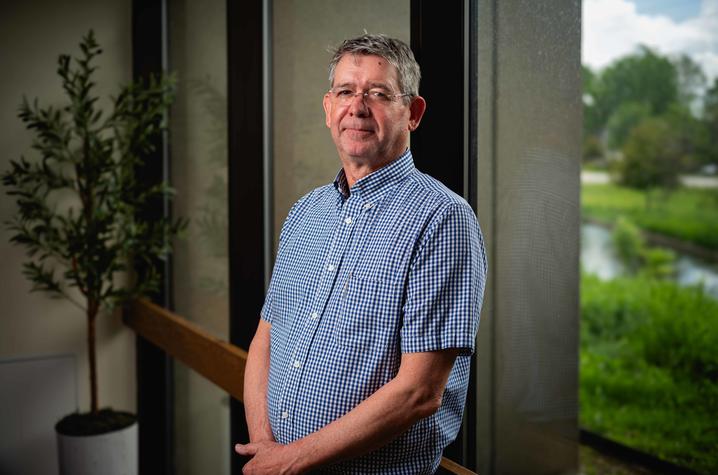Dan Howe: 2025-26 University Research Professor Q&A

Dan Howe, Ph.D., professor of molecular parasitology in the Department of Veterinary Science in the UK Martin-Gatton College of Agriculture, Food and Environment, has been honored as a 2025-26 University Research Professor.
Howe works in the Maxwell H. Gluck Equine Research Center and has served in various administrative roles in the center and department since joining UK in 1999.
His research focuses on the biology of pathogenic protozoa — single-celled organisms that cause disease. His research previously has focused on the protozoa Toxoplasma gondii, which can cause symptomatic infections in pregnant women and those with weakened immune systems. In his current work he’s focused on Sarcocystis neurona, the primary cause of equine protozoal myeloencephalitis (EPM). It’s one of the most prevalent causes of neurologic disease in horses in North and South America and is spread by opossums.
EPM is difficult to diagnose and treat. Howe’s lab is working to change that through the development of molecular genetic and genomic resources to investigate both the protozoa and EPM. He holds three U.S. patents based on his research at UK, which have led to commercially available tests for EPM diagnosis.
Howe’s work has been supported by state, federal, industry and private funding sources, resulting in more than 100 peer-reviewed publications, book chapters and articles.
Howe spoke with UKNow about his latest honor as a University Research Professor in this Q&A.
UKNow: What does it mean to you to be recognized as a University Research Professor?
Howe: I am very pleased to represent my department and college as a University Research Professor and to be associated with the current cohort and past recipients of this award. It is indeed a distinguished group of UK faculty members. While I think we all believe in the value of the work we do, it is very gratifying to be recognized for our efforts and accomplishments.
UKNow: How will the professorships program advance your research?
Howe: The University Research Professorship will heighten the profile of my research program as well as all of the good work done in the Department of Veterinary Science. Certainly, positive recognition serves to provide more opportunities for collaboration, funding and student training. Of course, the monetary award that comes with the University Research Professorship is a nice bonus that lends additional support for our efforts in the lab.
UKNow: What inspired your focus on this area of research?
Howe: I’ve had a long-standing interest in parasites and their ability to inhabit and sometimes cause disease in humans and animals. Before coming to Kentucky, my research was focused largely on opportunistic protozoan pathogens of humans, particularly Toxoplasma gondii. Fortunately, I was given the opportunity to join UK’s Department of Veterinary Science to investigate a closely related pathogen, Sarcocystis neurona, which causes the neurologic disease EPM in horses. This has allowed me to work on an important issue affecting the health and wellbeing of horses while also generating research findings that benefit human health.
UKNow: How does your research impact Kentucky?
Howe: Horses represent one of Kentucky’s signature industries that contributes significantly to our economy. My research program supports the equine industry by producing information that enhances efforts to care for horses suffering from the debilitating disease EPM. Moreover, the research conducted in my lab has broader impacts by contributing findings that give the scientific and medical community a better understanding of related parasites, including pathogens of humans such as Toxoplasma gondii.
About the University Research Professors
Each year, the University of Kentucky Board of Trustees approves a cohort of faculty as University Research Professors. The distinction recognizes excellence in work that addresses scientific, social, cultural and economic challenges in Kentucky and the world.
College leadership developed criteria for excellence within their area of expertise and then nominated faculty who excelled at these criteria. Each University Research Professor receives a one-year award of $10,000 and participates in other events planned around the program.

